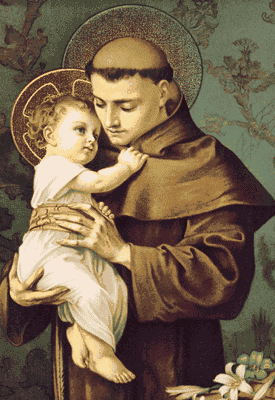
Actions speak louder than words; let your words teach and your actions speak.
-Saint Anthony of Padua, Doctor of the Church
Saint Anthony was born as Fernando Martins de Bullhoes on August 15th, 1195 in Lisbon Portugal. His family was very wealthy and were potentially related to nobility in Portugal - that wealth allowed them to send a young Saint Anthony to the local Cathedral school. At 15 he entered the Augustinian community of Canons Regular of the Order of the Holy Cross outside Lisbon. As much as he enjoyed the lifestyle here, Saint Anthony soon fell tired of the frequent visits by childhood friends and family and so, in 1212, he asked to be transferred to the Motherhouse of the congregation in Portugal.
Soon after arriving at the mother house in the town of Coimbra, Saint Anthony was ordained a priest and named guestmaster (in charge of the hospitality of the abbey). He soon found himself attracted the simple, frugal lifestyle of the Franciscan friars who had recently settled into a nearby hermitage dedicated to Saint Anthony of Egypt. Inspired by the story of the Franciscans who had just recently been martyred in Morocco, he sought permission and received it to leave the Canons Regular and to join the Franciscan order. Soon after joining the friars the hermitage he began to be known by the Saint it had been dedicated to - Anthony.
Now a member of the Franciscans, Saint Anthony hoped to depart for Morocco but fell ill. The returning voyage was met with a storm and so the ship landed in Sicily where he was assigned to the rural hermitage of San Paolo near Forti. It was here that Saint Anthony became known far and wide for his excellent preaching skills and supreme depth of knowledge with scriptures. He caught the attention of Saint Francis of Assisi and for a time the two were close. So close, in fact, that Saint Francis entrusted the pursuit of studies for any Franciscan friars to Saint Anthony.
There are several legends and traditions associated with Saint Anthony. He is often invoked to help find lost items as he had his psalter stolen by a novice who had left the order. Because there were no printing presses and the Franciscans had taken such strong vows of poverty, it would have been nearly impossible to have the psalter replaced. Saint Anthony though, instead of despairing, sat and prayed alone for it's return, trusting in God's will. The novice was moved one night and not only returned the psalter but asked to be returned into the order. In another story, a farmer mocked Saint Anthony for believing in the real presence. To show he was right, the farmer brought a donkey to Saint Anthony and held fodder in one hand and a Sacramental Host in the other, expecting the donkey to eat the fodder. The donkey ate neither and instead bowed down in front of the Host.
In 1231, Saint Anthony fell ill with ergotism and went to the retreat at Camposampiero for time to rest. On their way back to Padua, Anthony's illness suddenly grew worse and he passed away at the Poor Clare Monastery at Arcella on June 13th, 1231. Pope Gregory IX canonized him on May 30th, 1232, less than a year after his death, making him one of the fastest canonized Saints in history. On January 16th, 1946, Pope Pius XII proclaimed Saint Anthony a Doctor of the Church saying that the freshness and beauty of the Gospel emerge from his writings. His feast day is celebrated on June 13th.